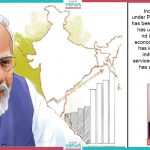Kathmandu: Every person, either a commoner or a political figure, is guided by some of the preconceived political ideologies. This guidance may be due to the effect of the political environment in which he or she is brought up. There are various political system that governs a person or a party. Out of which, “Soft Power” is one of the popular ideologies being hyped in the global scenario.
British Historian Niall Ferguson described the “Soft Power” as a non-traditional force either cultural or commercial goods and then promptly dismissed it on soft grounds. Referring to Ferguson, Joseph S, Nye Jr. claims a country’s soft power coming three resources i.e. its culture, its political values, and its foreign policies.
Joseph defines Soft Power as more humane than hard power as it has been hyped as an alternative to raw power politics. Usually, ethically minded scholars and policymakers embrace this strategy for good or evil causes. World Leaders, from Hitler, Stalin, and Mao to Mohandas Gandhi and Martin Luther King have applied this strategy to accomplish their political goals.
In the same manner, the emerging leaders of Nepal seem to have acknowledged the strength of “soft power” and have been applying for a paradigm shift in the politics of Nepal. Kathmandu Metropolitan City Mayor Balendra Shah and Rastriya Swatantra Party Leader Chairperson, as well as Home Minister Rabi Lamichhane, are reflecting the soft power strategy in their political functioning. This has helped them to create their separate identity from the leaders of old political parties.
Relying excessively on charismatic leaders to address intricate societal issues can foster unrealistic expectations. When these leaders confront challenges or fall short of expectations, it often results in public disillusionment and disappointment.
In the dynamic realm of Nepali politics, new figures have emerged, introducing fresh perspectives and methodologies. Among these are Balen Shah and Rabi Lamichhane, both unconventional in their backgrounds. Balen, a former rapper, and Rabi, a former journalist, have garnered considerable attention for their unique approaches to engaging the public and instigating change.
In Nepali political discourse, these two individuals stand out for their distinctive methods of communication and mobilization. Balendra Shah, known simply as Balen, has risen to prominence through his rap music, which addresses issues such as corruption and injustice. Praised for his authenticity and adeptness in utilizing social media, Balen has amassed a significant following, particularly among the younger demographic.
Conversely, Rabi Lamichhane, formerly a prominent television journalist, has transitioned into politics to continue his crusade for holding those in power accountable. Renowned for his investigative acumen and grassroots approach, Rabi endeavors to amplify the voices of ordinary Nepalis.
Balen and Rabi epitomize a departure from conventional political norms, showcasing how fresh perspectives and unorthodox methodologies can wield significant influence in Nepal’s political landscape.
Balen Shah: The Cultural Vanguard
Balen Shah, or Balen, has tapped into Nepal’s youth culture to establish a formidable political presence. Through his rap, Balen articulates the aspirations and grievances of the younger generation, striking a chord with their concerns. His authenticity and relatability have endeared him to a devoted following, particularly among the youth demographic. Balen’s proficient use of social media platforms further amplifies his message and facilitates direct engagement with his supporters.
Beyond cultural influence, Balen advocates for substantive policy reforms, including education, anti-corruption measures, and sustainable development. Consequently, he was elected as Mayor of Kathmandu Metropolitan with a substantial majority and garnered international recognition within a short period.
Rabi Lamichhane: The Media Maverick
Rabi Lamichhane’s transition from journalist to political activist underscores the potency of media influence in shaping public discourse. As a television personality, Rabi earned public trust and credibility through his incisive coverage of issues relating to corruption and inefficiency. His foray into politics has enabled him to leverage his media expertise to effectively communicate his vision.
Rabi’s grassroots engagement and communication skills have broadened his appeal across diverse segments of society. His commitment to representing the people’s voice, honed through years of journalism, positions him as a beacon of accountability and transparency. Consequently, he was elected twice by the people of Chitwan, despite facing controversy regarding his citizenship.
Public perception plays a pivotal role in evaluating the efficacy of political leaders. Positive public opinion may indicate effective leadership, whereas negative perception may signal inadequacies or shortcomings in meeting expectations. Factors such as trust, credibility, and popularity among the electorate are crucial considerations.
Balen’s strong rapport with Nepali youth could translate into a dedicated support base for any political endeavor he undertakes. His outsider status in formal politics could bring a fresh perspective and innovative ideas to the fore, potentially appealing to voters disillusioned with traditional politicians. Moreover, his cultural influence and ability to engage with people through humor could raise awareness about critical political issues and galvanize support for various causes.
Challenges and Criticisms in Nepali Society
Lack of Political Experience: A primary criticism faced by both Balen Shah and Rabi Lamichhane is their lack of formal political experience. While their unconventional backgrounds may offer fresh perspectives, some critics argue that governing complexities necessitate expertise and experience that they may lack.
Populist Rhetoric vs. Substantive Policy Solutions: Despite garnering attention for their charismatic personas and public engagement, Balen Shah and Rabi Lamichhane have faced scrutiny regarding the depth of their policy proposals. Some contend that their emphasis on cultural influence and grassroots activism may overshadow the necessity for detailed, substantive policy solutions to tackle Nepal’s intricate challenges.
Internet Culture and Trolling in Nepal
Controversies and Ethical Concerns: Both Balen and Rabi have encountered controversies that have engendered ethical concerns among the public. For instance, Rabi Lamichhane’s involvement in a citizenship case has prompted queries about his credibility and integrity. Similarly, Balen Shah may undergo scrutiny over his past actions or statements as a rapper, potentially undermining his credibility as a political leader.
Limited Support Base: While Balen Shah and Rabi Lamichhane may boast dedicated followings within specific demographics, critics argue that their appeal may be restricted beyond their core supporters. Constructing broad-based coalitions and garnering support from diverse societal segments is imperative for sustained success in Nepali politics, and both leaders may confront challenges in broadening their support base beyond their initial fan base.
Ability to Deliver on Promises: As relatively new entrants to formal politics, questions arise concerning Balen Shah and Rabi Lamichhane’s capability to deliver on their promises and effectuate meaningful change. Maintaining public trust and credibility amid governing complexities necessitates more than just charisma and media adeptness, and both leaders will encounter scrutiny as they endeavor to translate their vision into tangible outcomes for the Nepali populace.
Addressing these challenges and criticisms would offer a more balanced appraisal of the ascendancy of Balen Shah and Rabi Lamichhane in Nepali politics, acknowledging both their strengths and potential limitations as political leaders.
Comparative Analysis
Comparing Balen Shah, Rabi Lamichhane, and other unconventional political figures with established political parties in Nepal elucidates the evolving dynamics of Nepali politics. Here are some points of comparison:
- Traditional vs. Unconventional Approaches: Established political parties in Nepal typically adhere to traditional campaigning and governance methods, relying on party structures, patronage networks, and entrenched hierarchies. In contrast, figures like Balen and Rabi represent departures from these norms, leveraging cultural influence, grassroots engagement, and social media to connect with voters directly. Their unorthodox approaches challenge the status quo and appeal to those disenchanted with traditional politics.
- Youth Appeal: Balen Shah and Rabi Lamichhane have garnered substantial support among young Nepali voters, who often feel disconnected from established political parties. Their ability to resonate with the aspirations and grievances of the youth demographic positions them as alternative voices in Nepali politics, offering fresh perspectives and innovative solutions to address the concerns of young people.
- Transparency and Accountability: A primary criticism of established political parties in Nepal centers on their perceived lack of transparency and accountability. Corruption, nepotism, and inefficiency are frequently cited as endemic issues within these parties. Figures like Balen and Rabi have prioritized transparency, accountability, and grassroots representation in their platforms, positioning themselves as advocates of good governance and integrity.
- Policy Priorities: Established political parties in Nepal often espouse entrenched ideological stances and policy agendas that may inadequately address the evolving needs and aspirations of the populace. Balen Shah and Rabi Lamichhane have focused on issues such as education, anti-corruption measures, sustainable development, and social justice, resonating with a broad cross-section of society. Their ability to articulate these concerns in an accessible manner has broadened their appeal.
- Electoral Success: While established political parties in Nepal have long dominated the political landscape, recent elections have seen the emergence of alternative voices and movements. Balen Shah’s election as Mayor of Kathmandu Metropolitan and Rabi Lamichhane’s successful campaigns in Chitwan despite controversies highlight the shifting dynamics of Nepali politics, where unconventional candidates can challenge established power structures and win popular support.
Overall, comparing Balen Shah, Rabi Lamichhane, and other unconventional political figures with traditional parties in Nepal underscores the changing nature of political competition in the country. While established parties still wield significant influence, the rise of alternative voices reflects a growing demand for transparency, accountability, and representation among the Nepali electorate.











